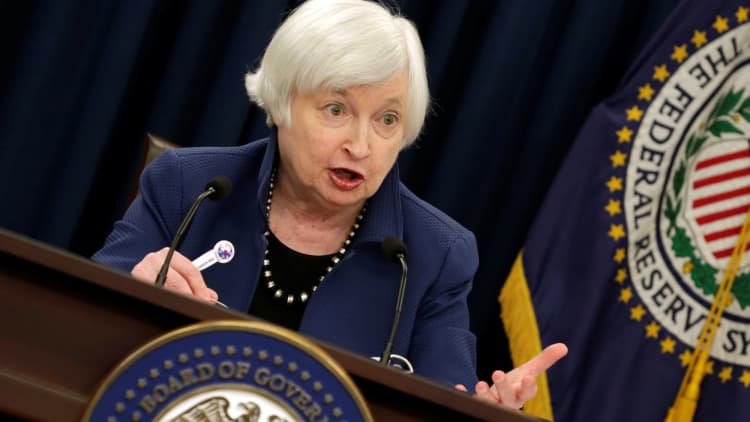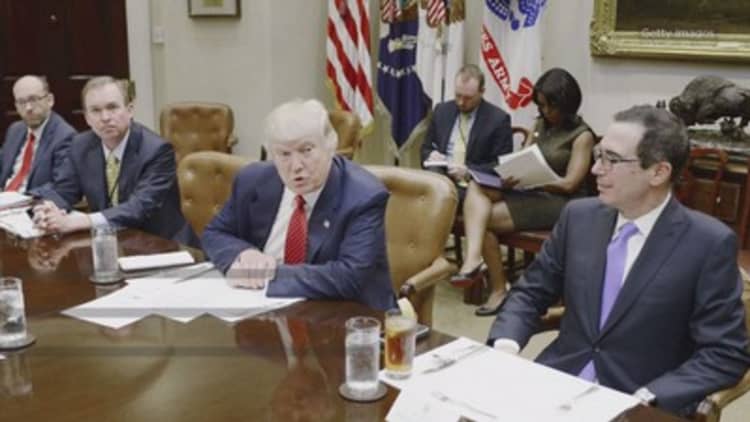
As the Federal Reserve starts its two-day meeting Tuesday, markets are primed for more information on how the Fed will begin the long process of shrinking its balance sheet.
The Fed's balance sheet ballooned to $4.5 trillion as it bought bonds in its quantitative easing program. That was the policy it created to help rescue the economy from the financial crisis and, later, to keep it from falling back into recession.
The Fed is expected to raise interest rates Wednesday, and it also expected to disclose more details on how it plans to reduce the mountain of Treasury and mortgage securities it holds. About $2.5 trillion of those securities are Treasurys.
"That's what everyone is going to be looking for. I don't think it's any surprise that they're going to be moving by 25 basis points. It's going to be a question of how they incorporate that with the balance sheet. If they don't say much about it, that's going to be viewed as very dovish by the market," said Jim Caron, fixed income portfolio manager at Morgan Stanley Investment Management.
The unwind is part of what is the Fed's biggest policy experiment ever, but it's unclear how it will progress and what kind of impact it will have. The Fed has said it could begin to unwind the balance sheet this year, and it laid out part of a possible process in the minutes of its last meeting. The Fed currently reinvests in the Treasury and mortgage market when its securities roll down or mature, and it is likely to gradually phase out replacing them.
Besides the balance sheet, the Fed on Wednesday is likely to give a nod to the fact that inflation has been weak. There are two inflation reports before the Fed makes its rate decision. The Producer Price Index will be released at 8:30 a.m. ET Tuesday and is expected to come in flat. Consumer Price Index inflation will be reported Wednesday, as are retail sales.
"There's little that could change their mind," said Diane Swonk, CEO of DS Economics.
The market is pricing in the June rate hike, but there is not very high conviction for a second one before the end of the year. Caron expects the next hike in September, but he says some Fed watchers expect the Fed to stay on hold in September because the U.S. could hit the debt ceiling. One of the concerns is that Congress will not resolve budget issues before the government runs out of money. That could upset financial conditions, making it impossible for the Fed to hike.
Treasury Secretary Steven Mnuchin spoke to that concern Monday. "If for whatever reason Congress does not act before August, we do have backup plans to fund the government. So I want to make it clear that that is not the time frame that will create a serious problem. However, markets do not want us to wait," Mnuchin said.
As for the balance sheet, Caron said Fed Chair Janet Yellen appears set on beginning the balance sheet reduction program before her term ends at the beginning of next year.
"My guess is it will be like a reverse taper, and then go up. Given we don't have any road map — and it's unprecedented — we are once again in uncharted waters. The Fed has their view of what's important, and the market has theirs," said Swonk.
The market is looking for details on the timing and what conditions the Fed would need to see in order to start the process. The markets also would be interested in seeing how much the Fed would plan to let roll off and what the caps would be.
Analysts said the Fed balance sheet reduction could send yields higher at the long end of the curve — affecting and instruments.
Caron said studies have shown there could be a slight impact. For instance, $350 billion of balance sheet roll off would equal a quarter point.
"The key question is whether the market is even responding to this balance sheet roll off? The answer is no," he said.
There is also NFIB small business survey data due at 6 a.m. ET Tuesday.



